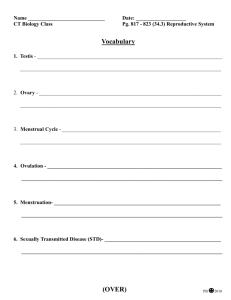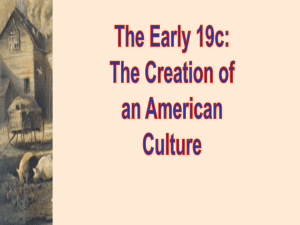Surrogacy - University of Warwick
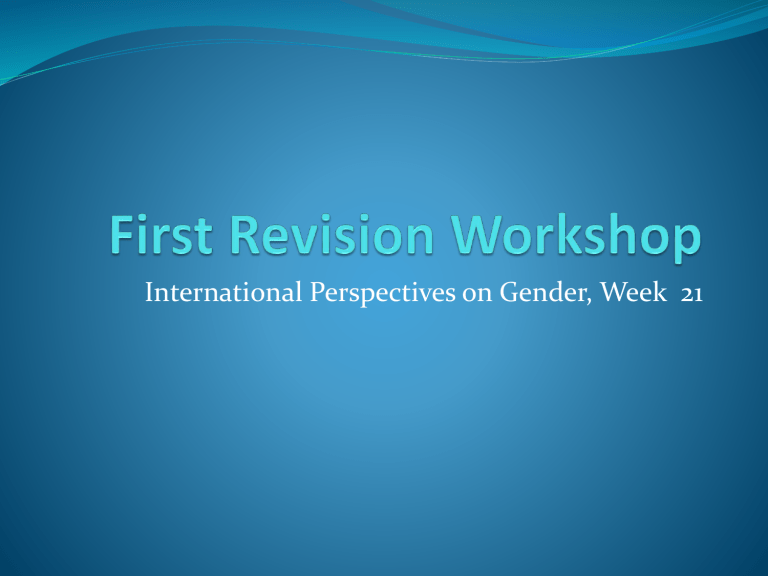
International Perspectives on Gender, Week 21
Workshop Aims
introduce the exam
provoke thought about your revision strategies
identify key concepts on the module
draw connections across the module
convince you that you already know more than you think
start thinking what you would need to know about in order to write on some term 1 topics
The Exam
When? Thursday 6 June, 9.30 am
Where? Westwood Games Hall
Duration? 3 hours, answer 3 questions
Rubric?
Section 1 Essay = 1 section 1 exam ?, 2 section 2
Section 2 Essay = 2 section 1 exam ?s, 1 section 1
No barring
Section 1: UK (1 question), Soviet Union/Russia (1 question),
China (1 question), Nationalism/Orientalism (1 question), South Africa (1 question)
Section 2: India (1 question), Hindutva/religious fundamentalism (1 question), Islam (1 question),
Ireland (1 question), Gender and global capitalism
(1 question)
Why do you do exams?
To assess what has been learnt over the academic year
University Regulations – pass year 1 to proceed
Assessing skills of prioritisation
Demonstrate time management skills
Classification
To demonstrate creativity, synthesis, originality
To demonstrate independent thinking
Revision Strategies
Write down what you got right in your revision strategy last year (or earlier) and how you achieved it.
Write down what you want to improve on in your revision strategy this year and how you’re going to do it.
Key Module Concepts
Sex (biological, fixed); Gender (social and cultural, constructed, mutable)
Gender divisions of labour, resources, opportunities; gender pay gap; horizontal and vertical gender segregation
Femininities / Masculinities (plural both within contexts and between them, but with striking commonalities eg what’s expected of men and women in nationalism); crisis in masculinity; patriarchal premium; hyper masculinity; hyper femininity
Sexuality; heterosexism; essentialism; social constructionism; nuclear family; symmetrical family; reproductive rights
State Socialism and Post-Socialism; patriarchal socialism; collectivization; collective ownership of means of production; proletariat; bourgeousie; surplus value; socialization of reproductive work; son-preference; one-child policy
Orientalism - the weaving into ‘knowledge’ of the idea that the west is innately superior to the east –
‘othering’; ‘legitimation’ of colonialism
Nationalism; nation-building; anti-natalist state; pro-natalist state
Apartheid and Post-Apartheid - migrant labour system; anti-apartheid movement; institutionalised racism; one person one vote; destabilization; intersections of gender, ‘race; and class
Colonialism & Imperialism (India, Ireland); welfarism; independence movements; partition
Religious fundamentalism; hindutva; communalism
Global capitalism; old international division of labour; new international division of labour; unionization; Fair-trade; Ethical trade; contradictory effects on women’s status
Key Module Objectives
What follows are 16 module objectives
Working in pairs, read through them, discuss what you think they mean and identify which module topics they are most associated with (many of them cover more than one).
Key Module Objectives
1. Resisting the idea that there is one ‘female’ point of view, or one ‘male perspective’ on any issue.
2. Recognising that while gender is an important difference
(generating patterns of (in)equality; (lack of) opportunity; status etc.), it is cross-cut by other differences.
3. Generating critical perspectives on any idea that gender relations are ‘natural’, inevitable, outcomes of biological difference etc.
4. Insisting that gender can only be understood in relation to social, cultural and historical processes, ie. that it is contingent.
5. Examining the symbolic importance of gender and extent to which it is at the centre of the religious and political ideologies and state practices that have dominated the last 100 years: colonialism; apartheid; nationalism; socialism/communism; religious fundamentalism
6. Paying attention to the way gender prescriptions (ideas about what gender relations should be like) have been a resource through which to legitimate the present as well as to imagine the future.
7. Examining and critiquing the idea that the level of gender equality is a short-hand marker of ‘civilization’.
8. Appreciating why women (and men) may not speak
‘gender oppression’ - through that their whole society/ethnic group/ class etc. may be judged.
9. Promoting reflexivity, ie. asking where ‘we’ are in the
‘knowing’ process about women and men’s lives around the world. Asking what sort of relations are entailed between us as ‘knowers’ and those we ‘know’ about?
10. Emphasising women’s and men’s agency and capacity for resistance and change, while not ignoring structural barriers to agency.
11. Demonstrating the need to continually disaggregate the categories women and men, through the diversity of their experiences around the world.
12. Contesting universalisms - the idea that there is one type of oppression of women, and one solution to it.
13. Recognizing and critiquing gender stereotypes, eg. the Muslim woman.
14. Recognising that some women can oppress other women, that some women can oppress men, and that men can work for gender equality and women’s empowerment.
15. Emphasising the need for specific, historical analysis on a case by case basis, at the same time as recognising patterns (eg. the gendered ‘scripts’ of nationalist movements; gendered work).
16. Recognising the need to ask gendered questions about social change, eg. globalization.
Topic by Topic Revision
Work in small groups of 3/4
From what you can recall about each topic, try to come up with three bullet points that reflect the major learning points for those weeks. What are the three key points (e.g. the conclusions from the lecture) that you would need to think about when revising this topic?
You won’t remember everything – don’t worry, it’s not a test. It’s a starting point for your revision (and you know more already than you might feel like you do).
Sex and Gender
Sex = biological marker of sexual difference
Gender = socio-cultural content/meaning attached to this biological marker.
Where sex is privileged in analysis, the differences between men and women’s status/skills/character etc. are generally put down to biology and are seen as fixed, natural and inevitable.
Where gender is privileged in analysis these differences are seen as variable, products of society and culture and capable of transformation.
UK - Education and Work
Girls disadvantaged by education system in relation to boys in past - now claimed boys are losing out
Are boys discriminated against? Or is hegemonic masculinity partly incompatible with educational success?
Women’s labour market participation risen dramatically since 1970s, but concentrated in part-time, low-paid services
Gender pay gap endures, but growing differences between women
Women’s lower status and prioritisation of reproductive work is carried into labour market
Workplace identities are central to performance of masculinities, in relation to women and other men
UK – Family and Sexuality
Nuclear family vs. diversity of family forms (single parents, recombinant families, gay and lesbian families)
Family values lobby: nuclear is best, diversity = crisis
Sociology: diversity is here to stay, the crisis is ideological
Gendered power relations in marriage
Young and Willmott’s Symmetrical Family: has it arrived?
What explains the diversity of family forms today?
Is sexuality a natural drive (essentialist view) or a social product (social constructionist view)?
Heterosexism - unconscious or explicit assumption that heterosexuality is only normal form of sexual relations.
•
Marxism and Soviet Union
Marxism: Proletariat need revolution to end class oppression
(bourgeoisie exploiting surplus value)
Engels: gender oppression akin to class oppression & should: abolish private property and collectivize
- incorporate women into the paid work-force
- socialize reproductive work (house-work and child
- bring women fully into revolutionary politics
1917 Russian Revolution delivered new legal rights for women and entry into full-time paid work but failed to fully socialize reproductive work and politics was state-controlled only
Communist state only allowed heterosexuality, to produce children and meet men’s ‘natural’ needs
Under Stalin some rights eroded – divorce made more difficult, abortion prohibited, state overtly pronatalist
Post-Communist Russia
1989: Berlin wall falls and beginning of end of USSR
Today’s (shrunken) Russia largely capitalist
New freedoms – to buy western goods, travel – but unemployment, high inflation, loss of state support
Growing income inequalities
Women disproportionately unemployed at first
(motherhood seen as their primary identity)
Today talk of crisis among urban working class Russian men – unemployed, marginalized from work and home
Is rise of prostitution/pornography a liberation of sexuality or women’s objectification & commodification?
Heterosexual relations still bound by gender stereotypes
China
1949 Revolution: women’s legal rights improved quickly
Agricultural co-ops still based on family units – with collectivization from late 1950s women earned own wages
Socialization of reproductive work partial and resisted
Socialism was patriarchal – patriarchy accommodated to safeguard revolution, food supplies
Cultural Revolution = doomed attempt to crush peasant farm
One-child policy: a rational strategy or an abuse of women’s reproductive rights? Has fuelled son-preference
Non-marriage seen as abnormal and state heterosexist
Rural women doubly hit by population control & land reform
Urban women better off but labour market discrimination
Women’s political involvement is state controlled
Orientalism / Nationalism
Edward Said’s Orientalism: weaving into knowledge idea that West is innately superior to east
Used to ‘legitimate’ colonialism and imperial expansion
Treatment of women is one of markers of supposed
Western civilisation and Eastern barbarity
Accounts of gender inequalities can be orientalist, ignoring history, ignoring women’s resistance . How to avoid?
Nationalism: political movement to establish or re-establish nationhood; narrative about who belongs to a nation
Women are central as biological and cultural reproducers of the nation and ‘protecting’ them can legitimate militarism
Symbolically women’s roles=conservative; in practice less so
Men expected to do nationalism, to fight, strategize, exibit hyper masculinity
Next Week…
Continue topic by topic
Making links between topics
Tips on survival in the exam room
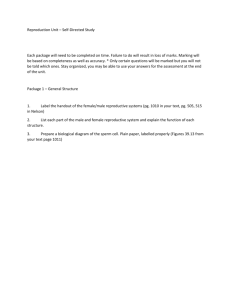
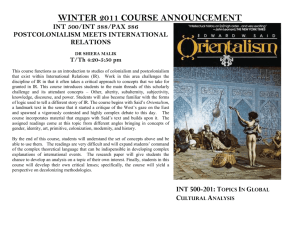
![“The Progress of invention is really a threat [to monarchy]. Whenever](http://s2.studylib.net/store/data/005328855_1-dcf2226918c1b7efad661cb19485529d-300x300.png)


